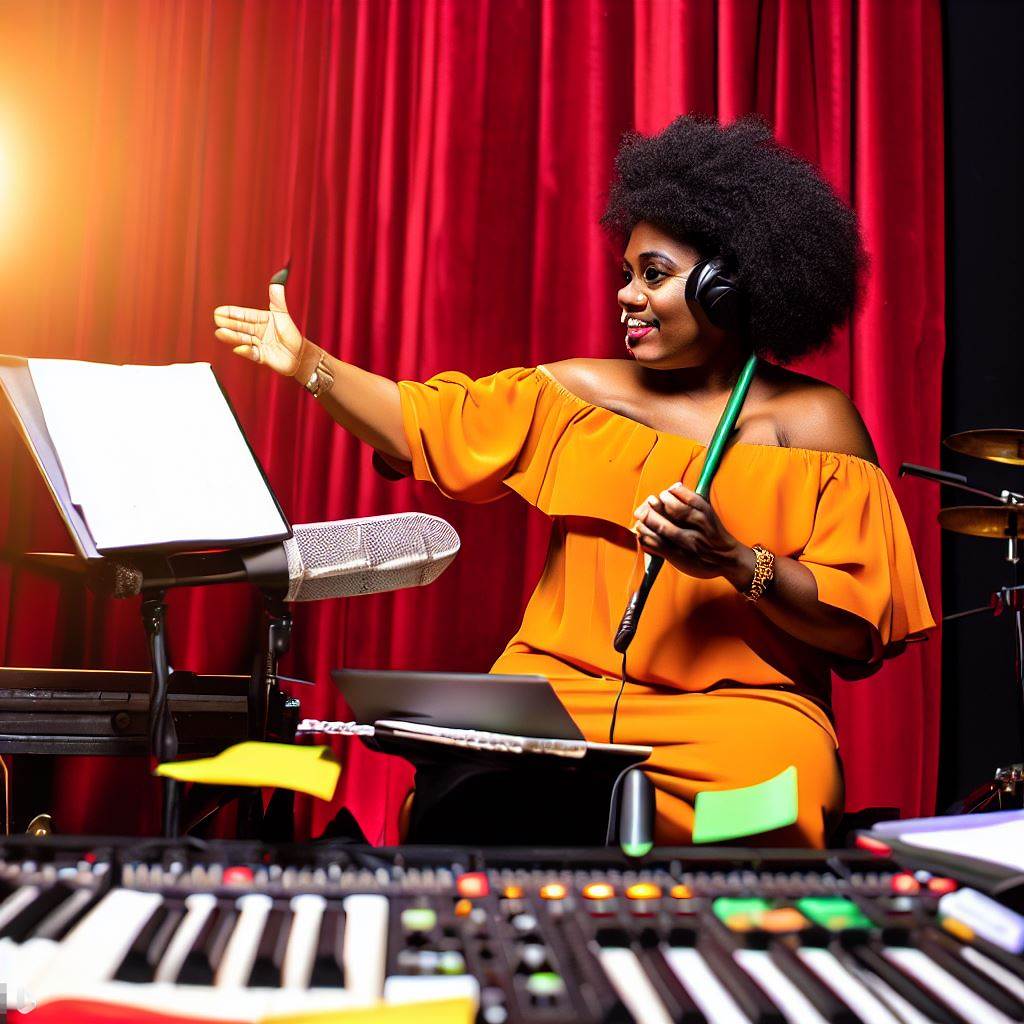Introduction
The evolution of the Music Director profession in Nigeria has been a fascinating journey.
Music holds a significant place in Nigerian culture, serving as a means of communication, expression, and identity.
It is an integral part of daily life, ceremonies, and celebrations.
Nigerian music has evolved over the years, and so has the role of the Music Director.
This blog post aims to explore the history, growth, and impact of Music Directors in Nigeria.
We will delve into their role as the orchestrators and leaders of musical ensembles, providing guidance, direction, and creativity.
Music Directors play a vital role in Nigerian music, ensuring the harmony and synchronization of various instrumentalists and vocalists.
They possess in-depth knowledge of musical theory, instruments, and genres, enabling them to coordinate and shape musical performances.
Furthermore, Music Directors serve as custodians of cultural heritage, passing down traditional melodies, rhythms, and dance forms across generations.
They are instrumental in preserving and promoting Nigerian music worldwide. Through their expertise, they elevate performances and pave the way for new musical trends and fusions.
This blog post will shed light on the challenges faced by Music Directors, their impact on the Nigerian music industry, and how their role continues to evolve in response to changing tastes and technology.
It aims to highlight the dedication, passion, and skill required to be a successful Music Director in the vibrant Nigerian music scene.
The evolution of the Music Director profession in Nigeria reflects the dynamism of Nigerian music itself.
It is a testament to the rich cultural heritage and the tireless efforts of those who have dedicated their lives to bringing the magic of music to the forefront.
Historical Perspective
The early origins of the Music Director profession in Nigeria
The early origins of the Music Director profession in Nigeria can be traced back to traditional tribal practices.
Music has always played a significant role in Nigerian society, with various tribes incorporating music into their daily lives.
The traditional role of music in Nigerian society
During ancient times, music in Nigeria was primarily used for rituals, ceremonies, and entertainment purposes.
Traditional Nigerian music was performed by skilled musicians who were highly respected individuals in their communities.
These early music directors would lead groups of musicians and orchestrate performances for various events.
How the Music Director profession has evolved over time
Over time, the role of the Music Director began to evolve as Nigeria was influenced by external cultures and musical styles.
With the arrival of colonialism, Western music and instruments were introduced to Nigeria, transforming the music scene.
The Music Director profession adapted to these changes and began incorporating Western musical techniques and instruments into their performances.
By exploring the historical perspective, we gain a deeper appreciation for the significance of the Music Director profession in Nigeria and its contribution to the rich musical heritage of the country.
Role and Responsibilities of a Music Director
In Nigeria, the role of a music director is crucial in shaping the overall musical experience across various settings.
Whether it is in churches, bands, or cultural events, music directors play a significant role in delivering captivating performances and creating a memorable musical journey for the audience.
Define the Role of a Music Director in Nigeria
A music director in Nigeria is the artistic and visionary leader who oversees and coordinates the musical aspects of a performance or event.
They have the responsibility of bringing together different musical components to create a harmonious and engaging experience.
Music directors are not limited to directing or conducting performances; they are involved in every aspect of the musical production.
They work closely with musicians, singers, and other performers to ensure a cohesive and exceptional performance.
Explain the Key Responsibilities of a Music Director in Various Settings
1. Churches
- Selecting appropriate hymns, songs, and musical arrangements for religious services.
- Leading and directing choirs, bands, or orchestras during worship services.
- Providing guidance and training to choir members to enhance their musical abilities.
- Collaborating with pastors and other church leaders in planning an impactful musical program.
2. Bands
- Choosing suitable musical repertoire for the band’s performances.
- Rehearsing and conducting the band during practices and live shows.
- Arranging and orchestrating music pieces to suit the band’s instrumentation and style.
- Maintaining discipline and coordinating rehearsals to ensure a tight and polished performance.
3. Cultural Events
- Curating and creating musical programs that reflect the cultural essence of the event.
- Working with event organizers and artists to determine the appropriate musical elements.
- Coordinating rehearsals and ensuring seamless transitions between different musical segments.
- Overseeing the technical aspects, such as sound engineering and stage setup, for optimal musical
delivery.
The Importance of Music Directors in Shaping the Overall Musical Experience
Music directors are vital in shaping the overall musical experience as they bring their expertise, vision, and leadership to the table. Their contributions are significant in the following ways:
- Artistic Direction: Music directors have the ability to interpret the artistic vision of a performance or event and translate it into a cohesive musical presentation.
They ensure that the music aligns with the desired atmosphere, emotional impact, and thematic elements. - Quality Control: Through their knowledge and skills, music directors maintain high standards of musicianship and performance quality.
They are responsible for selecting talented musicians, singers, and performers and guiding them to reach their full potential. - Coordination and Unity: Music directors bring together a diverse group of artists and musicians and facilitate a sense of unity and synchronization.
They ensure that everyone is on the same page and working towards a collective musical goal, resulting in a harmonious performance. - Engaging the Audience: Music directors understand the importance of capturing the audience’s interest and creating a memorable experience.
They know how to select songs, arrange musical sequences, and create moments of impact to keep the audience engaged and entertained throughout the performance. - Musical Innovation: With their extensive knowledge of different musical genres and styles, music directors have the ability to experiment and infuse new elements into traditional performances.
They bring fresh ideas and perspectives to enhance the musical experience and make it relevant to contemporary audiences.
Music directors in Nigeria transform the musical scene through artistic leadership, quality performances, and audience engagement, fostering innovation.
Their influence resonates with artists and spectators.Their contributions shape the overall experience and leave a lasting impact on both the artists and the audience.
Read: The Role of Nigerian Animation Directors in Adverts
Influence of Western Music
When examining the evolution of the Music Director profession in Nigeria, it is impossible to ignore the significant impact of Western music.
From the introduction of Western music styles and techniques to the fusion of traditional Nigerian music with Western elements, the influence has greatly shaped the role of Music Directors in the country.
1. Impact of Western music on the Music Director profession in Nigeria
- Western music brought new concepts, ideas, and approaches to the Nigerian music industry.
- It expanded the musical horizons of Music Directors, allowing them to explore different genres.
- The introduction of Western music led to the professionalization of the Music Director role.
- Music Directors began incorporating Western instruments and orchestration techniques into their compositions.
- The demand for Music Directors who could bridge the gap between Western and traditional Nigerian music increased.
- Western music opened up opportunities for Music Directors to collaborate with international artists and participate in global music events.
2. Influence on the role of Music Directors
- With the infusion of Western music, the role of Music Directors expanded beyond traditional Nigerian music.
- They had to adapt to Western music styles and techniques while maintaining their Nigerian musical identity.
- Music Directors became responsible for directing Western-style bands, orchestras, and choirs.
- They had to train and guide musicians in understanding and performing Western music.
- Music Directors started arranging Nigerian traditional songs with Western harmonies and instrumentation.
- They played a vital role in transcribing and notating traditional Nigerian music to make it accessible in Western contexts.
3. Fusion of traditional Nigerian music with Western elements
- Western music introduced harmony, chord progressions, and new tonal concepts to traditional Nigerian music.
- Music Directors incorporated Western instruments like the piano, guitar, and saxophone into Nigerian ensembles.
- They fused Nigerian rhythms and melodies with Western genres like jazz, funk, reggae, and pop.
- Nigerian musicians started experimenting with Western recording techniques and production methods.
- The fusion of traditional Nigerian music with Western elements resulted in the birth of new genres like Afrobeat and highlife.
- Music Directors played a crucial role in popularizing these fusion genres both locally and internationally.
The influence of Western music on the Music Director profession in Nigeria cannot be overstated.
It has enriched the musical landscape, expanded the role of Music Directors, and facilitated the fusion of traditional Nigerian music with Western elements.
This cross-cultural exchange has not only shaped the career of Music Directors but also contributed to the diversity and global recognition of Nigerian music.
Read: The Impact of Digital Media on PR in Nigeria
Professional Training and Education
The education and training required to become a Music Director in Nigeria
In order to become a Music Director in Nigeria, individuals need to undergo specific education and training. Here are some key points to consider:
- Required Education and Training:To excel in the field of music direction, aspiring individuals need to have a strong foundation in music.
They should possess a minimum of a Bachelor’s degree in music or a related field. This education equips them with the necessary theoretical knowledge and practical skills.
The available music programs and institutions that offer relevant courses
In Nigeria, several institutions offer music programs that are relevant to becoming a Music Director.
Some prominent ones include
- Department of Music, Obafemi Awolowo University
- – Department of Music, University of Ibadan
These programs provide comprehensive training on music theory, composition, conducting, and other essential aspects of music direction.
The importance of continuous learning and skill enhancement in this profession
- Importance of Continuous Learning:Continuous learning plays a significant role in the development and success of a Music Director in Nigeria.
As music is an ever-evolving art form, it is crucial for Music Directors to stay updated with the latest trends, techniques, and technologies.
This can be achieved through attending workshops, seminars, and conferences related to music. - Skill Enhancement:To thrive in the competitive music industry in Nigeria, Music Directors need to continually enhance their skills.
They can do this by participating in masterclasses, collaborating with other musicians, and engaging in practical experiences such as conducting local music groups or leading church choirs.
Additionally, having proficiency in playing at least one musical instrument is valuable for Music Directors as it enhances their understanding of different musical elements.
Read: Exploring the Nigerian Animation Market: An Overview

Rise of Digital Technology
Impact of Digital Technology on the Music Director Profession
- Introduction of digital technology has revolutionized the music director profession in Nigeria.
- Increased accessibility to digital tools has expanded the scope and capabilities of music directors.
- Digital technology has improved efficiency in music composition, production, and performance.
- Music directors now have access to a wide range of virtual instruments and software to enhance their compositions.
- Collaboration and communication among music directors and musicians have been greatly facilitated by digital platforms.
- Digital technology has made it easier for music directors to experiment with different sounds and styles.
Digitization’s Influence on Music Composition, Production, and Performance
- Digitization has democratized music composition, allowing aspiring music directors to create professional-level compositions.
- Virtual instruments and software have made it possible to produce high-quality recordings without expensive studio equipment.
- Digital technology enables music directors to manipulate and edit recordings with precision and ease.
- Real-time collaboration on projects has become a reality through the use of digital tools.
- Live performances can be enhanced with the use of digital effects and virtual instruments.
- Digitisation has also opened up new opportunities for music directors to distribute and promote their work online.
Skills Required for Music Directors to Effectively Utilise Digital Tools
- Proficiency in digital audio workstations (DAWs) and music production software is essential for music directors.
- Knowledge of MIDI (Musical Instrument Digital Interface) is crucial for integrating virtual instruments into compositions.
- Understanding of sound engineering principles helps music directors achieve optimal recording and mixing results.
- Ability to adapt to new technologies and stay updated with the latest advancements in digital music production.
- Effective communication skills to collaborate with musicians, producers, and sound engineers through digital platforms.
- Creativity and experimentation are important to explore the full potential of digital tools and create unique compositions.
Overall, the rise of digital technology has greatly influenced the music director profession in Nigeria.
It has expanded the creative possibilities of music composition, production, and performance.
Music directors now have access to a wide range of digital tools and virtual instruments that enhance their artistic vision.
The democratization of music composition and production has allowed aspiring music directors to create professional-grade music without the need for expensive equipment.
However, to effectively utilize digital tools, music directors need to possess skills in digital audio workstations, MIDI integration, sound engineering, and effective communication.
Adapting to new technologies and staying updated with advancements in digital music production is crucial for success in this evolving profession.
Overall, the advent of digital technology has brought both challenges and opportunities for music directors in Nigeria, shaping the way they compose, produce, and perform music.
Read: Exploring the Nigerian Animation Market: An Overview
Challenges Faced by Music Directors
The challenges faced by Music Directors in Nigeria
One of the challenges faced by Music Directors in Nigeria is the lack of recognition and support for the profession.
Music Directors often struggle to gain the same level of respect and acknowledgement as other professions in the country.
The limited recognition and support for the profession
The limited recognition and support for Music Directors can make it difficult for them to secure employment opportunities.
Another challenge faced by Music Directors is the need for better funding, resources, and infrastructure.
The need for better funding, resources, and infrastructure
Many music programs and institutions in Nigeria are understaffed, underfunded, and lacking in necessary equipment.
Without adequate funding and resources, Music Directors may struggle to provide quality instruction and performances.
Inadequate infrastructure, such as outdated or poorly maintained facilities, can also hinder the work of Music Directors.
Without proper performance spaces and equipment, Music Directors may face limitations in showcasing their talents.
There is a need for increased government support and investment in music education and the arts in general.
By providing better funding and resources, the government can help to elevate the profession of Music Directors in Nigeria.
Success Stories
- Femi Aiyeola: Aiyeola is a renowned Music Director in Nigeria, known for his exceptional compositions and arrangements.
His contributions to the industry and society are remarkable, as he has created some of the most iconic musical pieces. - Funmi Onabolu: Onabolu is a trailblazing Music Director who has made significant contributions to Nigeria’s music industry.
Her unique style and innovative approach have inspired many aspiring music directors. - Tunde Adekoya: Adekoya is a highly respected Music Director in Nigeria who has worked with numerous top artists to produce chart-topping songs.
His ability to bring out the best in artists has made him a sought-after director in the industry. - Chioma Nwosu: Nwosu is a talented Music Director who has been instrumental in shaping the Nigerian music scene.
Her versatility and expertise in various genres have made her a sought-after director for both established and emerging artists. - Bayo Bamiro: Bamiro is a visionary Music Director who has revolutionised the way music is presented in Nigeria.
His creative concepts and attention to detail have elevated performances to a whole new level, captivating audiences across the nation.
These success stories of renowned Music Directors in Nigeria highlight their immense contributions to the industry and society.
Through their exceptional compositions, arrangements, and innovative approaches, they have transformed Nigerian music.
Their work has not only entertained audiences but also inspired a new generation of Music Directors.
The success and achievements of these directors serve as beacons of hope for aspiring directors, encouraging them to pursue their dreams and push boundaries.
Conclusion
The blog post discussed the evolution of the Music Director profession in Nigeria.
We explored how this role has transformed over the years, adapting to changes in the music industry and embracing new technologies.
We highlighted the key responsibilities and skills required of a Music Director, including selecting and arranging music, conducting rehearsals, and coordinating with musicians and other professionals.
The importance of the Music Director profession in Nigeria cannot be overstated.
They play a crucial role in shaping the sound and quality of music in the country, working behind the scenes to bring out the best in artists and performances.
Looking towards the future, there are promising trends and growth opportunities in this field.
As the Nigerian music industry continues to thrive and gain international recognition, the demand for talented and skilled Music Directors will only increase.
With advancements in technology, Music Directors will have access to a wide range of tools and resources to enhance their work and explore new creative possibilities.
The Music Director profession in Nigeria has come a long way and will continue to evolve. It is a vital component of the music industry, and its significance will only grow in the years to come.
We can look forward to seeing more talented Music Directors emerge, contributing to the growth and success of the Nigerian music scene.




